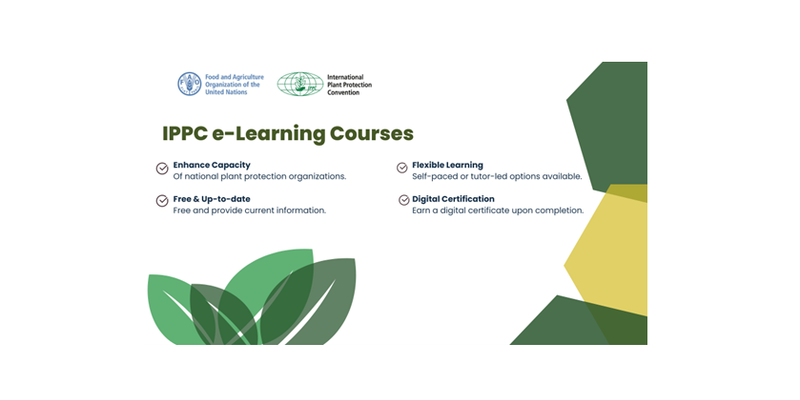SPOTLIGHT: IPPC e-learning courses promote excellence in international phytosanitary work
Posted on Wed, 31 Jan 2024, 14:45

January 24 marked the United Nations Day of Education, a global observance of the essential role of education in achieving the 17 Sustainable Development Goals (SDGs). In its work of protecting plant resources from pests, the International Plant Protection Convention (IPPC) contributes to achieving a number of the SDGs, including ending poverty, ending hunger, climate action and protecting life on land- SDGs 1,2,8,12,13,15 and 17. The IPPC Secretariat, particularly through its governing body- the Commission on Phytosanitary Measures (CPM), also prioritizes learning and education as essential building blocks for a strong international phytosanitary community.
With the growing risk and impact of plant pests, globalization creating more pathways for pests to travel, and climate change destroying ecosystems, the world needs plant health experts with adequate technical skills and knowledge to protect plant resources from pests and support trade in plants and plant products. Moreover, setting standards is worthwhile only if contracting parties have the technical knowledge to implement them. The IPPC Secretariat is helping to meet this need through its implementation and capacity development (ICD) work.
The Secretariat has so far produced 31 IPPC guides and training materials, and organizes learning events such as webinars and training, offering the most up-to-date and globally recognized information on plant pests and capacity development. These learning resources also help to raise awareness about international phytosanitary standards, procedures and regulations. This work is possible through the generous funding of various donors and time volunteered by numerous global experts, to the development and translation of the materials.
IPPC e-learning courses
Since 2022, the IPPC Secretariat has been offering four freely available e-learning courses to strengthen phytosanitary capacity. The courses, developed with support from the FAO eLearning Academy and the Committee Linking Entrepreneurship-Agriculture, Development (COLEAD), are based on international phytosanitary standards, IPPC guides, and current scientific and technical information. Course participants can complete the 8-32 hours of training online or offline, at their own pace. This flexibility allows learners to prioritize courses that will improve their knowledge about plant health, at the same time carry out their day-to-day work. At the end of the training, learners receive a digital certificate or badge.
The IPPC e-learning courses, below, also include references and links to other relevant IPPC guides and training materials.
Surveillance and national reporting obligations: This course provides practical guidance on pest surveillance, pest status determination and developing a national pest reporting system. There are seven lessons, each lasting 30-40 minutes, that can be downloaded or completed online. The course is funded by the European Union and the Common Market for Eastern and Southern Africa (COMESA).
Pest risk analysis (PRA): Developed in collaboration with COLEAD, the course offers basics of PRA, its role and purpose, the concept of risk, probability, impacts and the international context of plant protection. The intermediate level course offers the three stages of the PRA process and a hands-on exercise to simulate these three stages.
Phytosanitary Export Certification System: Developed in collaboration with the FAO e-learning Academy, lessons focus on the phytosanitary export certification process, specifically, on the roles of plant and plant product producers, exporters, export inspectors and export supervisors. course
Phytosanitary Inspection: Developed together with COLEAD, the course covers key concepts on phytosanitary inspection and plant pests, import verification systems, and practical guidance on conducting safe inspection of specific commodities.
Plant health community embraces IPPC e-learning courses
By November 2023, over 2 000 learners from more than 70 countries had accessed the different IPPC e-learning courses. Increasingly, national plant protection organizations (NPPOs) are enrolling their staff in the courses. In East Africa, 79 staff of the Kenya Plant Health Inspectorate Service (KEPHIS) have registered for the Phytosanitary Inspection e-learning course.
NPPOs can also use the courses as part of their staff capacity development or orientation programmes for new staff. Their staff can take the courses individually or in combination with live or online tutoring by international experts. Doubtless, the IPPC e-learning courses are helping to improve competency and consistency in carrying out phytosanitary work worldwide, including among exporters, importers and government officials.
Universities and agricultural institutions have also adopted the IPPC e-learning courses and training materials.
“The IPPC training materials have helped me broaden my teaching, especially on preventing the introduction of quarantine pests, on the international phytosanitary context as specified by the IPPC, and on other important treaties such as the Sanitary and Phytosanitary Measures (SPS) agreement,” said Synda Boulahia Kheder, Professor of Entomology at the Institut national agronomique de Tunisie (INAT).
Related information: Pest risk analysis: Why we do it and why it is important? (youtube.com)

